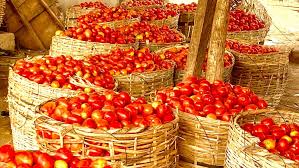The twin challenges of insecurity and climate change continue to impact food production in Nigeria, thus putting the country on the brink of food scarcity; BENJAMIN UMUTEME writes.
In a recent report, the World Bank Group predicted that Central and West Africa would experience food shortages due to geopolitical tension as well as climate change. The Washington- based lender noted specifically that between the months of June and August 2024, the region may likely experience food scarcity.
The report
The World Bank in its Food Security Update stated that the food and nutrition situation in Central and West Africa remains extremely troubling. According to the bank, the consolidated results of the Cadre Harmonisé analysis indicate that, in the Sahel and West Africa, 37.1 million people (38.1 million including Cameroon) are acutely food and nutrition insecure.
The global development finance institute stressed that unless appropriate measures are taken, this could rise to 49.5 million (52.5 million including Cameroon) between June and August 2024 (31.7 million in Nigeria, 3.4 million in Niger, 3.3 million in Chad, 2.7 million in Burkina Faso.
“The number of malnourished children in the region also continues to rise, reaching 16.7 million under the age of five. Production deficits, high food prices, limited market functionality, and the deteriorating security situation are all decreasing food security.
“Climate extremes are further pushing populations in the Sahel to migrate within western Africa toward areas with available natural resources, which is likely to increase because it is projected that per capita water availability will decline in the Sahel.
“More than 16 million people in Niger and Nigeria are expected to migrate internally by 2050. Food prices across West Africa are expected to rise in the coming months as household stocks are depleted, demand for food increases during Ramadan, and transportation costs remain high,” it noted.
The report further noted that the situation has led to a mixed trend in the prices of staple food in February across the region.
“In Nigeria, prices of staple food items are expected to increase because of continued supply tightening, rising demand, record annual inflation driven by depreciation of the naira, and high transport costs.
“In the Sahel, coarse grain prices were stable or decreased from January to February 2024, owing to seasonal harvests and low demand, but prices in Niger increased in February because of supply deficits and strong demand.
“Prices in Burkina Faso and Mali were lower than last year, but grain prices in Chad and Niger were higher amid production shortfalls and high transportation costs.
“Prices of local staples in Cameroon were stable from January to February 2024, except for bean prices, which rose following poor yields. “Prices of imported and processed commodities remained high in Cameroon because of global price trends and shipping costs.
“The cost of local and imported food staples in Togo increased from January to February 2024, especially for maize, given a decrease in availability and higher global commodity costs. Livestock prices in the Sahel increased in February 2024, except in some conflict-affected markets (e.g., Liptako-Gourma, Greater Lake Chad region),” it further said.
Climate change
Over the years, the impact of global warming, fallout of climate change, continues to change the pattern of food production. This has led to food insecurity in different regions across the world. However, in Sub Saharan Africa, the effect has been felt the most with food production taking a severe hit due to a lack of more ways of farming and increasing conflicts and displacement occasioned by climate actions.
Analysts have opined that the region is suffering from the impact of climate change due to its inability to adapt. According to them, the insecurity ravaging the region is also a fall out of the climate change impact.
According to Adefolarin Olamilekan, an economist, the impact of climate change on the food supply chain across the world cannot be quantified, especially in sub-Saharan Africa where countries are yet to adopt, mitigate and address some of its human cause factors.
He said, “In recent times situations around global warming as aftermath of climate change have created the twin problems of displacement of natural habitat, drought and shrinking famous river bodies like the Chad Basin Basin and other tributary rivers in Nigeria. These water bodies are contributing elements in agriculture production that includes livestock and irrigation farming as well dry farming and rice farming.
“Unfortunately, over time climate change has come to destabilize the cause of engaging in some of these farming processes, due to its impact on natural water, soil and sand that formerly aided food production in a much higher production.
“Yet, apart from climate change impacting negatively on agriculture, we are confronted with displacement, stabilisation and disruption of livelihood, particularly for sedentary farmers, tributaries, fishing communities and pastoral/herders. Due to these affected individuals, groups and families affected are now pushed into poverty and lack because many of them depend on produce from farmers, milk from their herds and fish sold to raise money for their health, education and other needs.
“Regrettably the adverse effect of climate change in no small way has disrupted the lives of people and their well-being.
“In addition, to the above is the insecurity problem resulting from the herders and farmers as well as displaced youth who have taken to crime and criminality to survive. Climate change is playing a negative role leading to high cost of food and farmers inability to produce much more food in Nigeria today.”
On her part, an environmental expert, Mrs. Angela Okoye-Kolawole, told this reporter that the impact of global warming has been taking its toll on food production over the years.
Mrs. Okoye-Kolawole said, “Climate change usually dictates the type of crops that can be cultivated in a region. The climate, therefore, determines the purpose a land can be used for. For her, it should not be surprising that the country is experiencing a high cost of food. This she said is part of the effect of climate change.
“The most influential climate factors are precipitation, temperature and sunlight. Changes in these factors have a direct effect on plants and animals in farms.
“Global warming over the years has resulted in climate change in several regions, influencing weather patterns, causing heat waves, heavy rainfall, and droughts.
“In Nigeria as is the case in most other African countries, climate change has led to unpredictable rainfall patterns. Since most of our arable crops are rain fed, poor crop yield and sometimes total crop failure have been experienced leading to increase in the prices of staple food.
“Increase in temperature resulting in heat waves has been blamed for burning of plants and poor germination of seeds. Most livestock are also affected by temperature changes. Layer birds record lower production and increase in cannibalism at higher temperatures.
“It is therefore not surprising that the cost of food increases daily in the open market.”
Meanwhile, the environmental expert stressed that “changes in the farming climate can sometimes produce favourable growth conditions for pests such as fungi, increasing plant and animal susceptibility to disease.”
Addressing the twin challenge
In order to address the challenges thrown up by climate change and insecurity, Mrs. Okoye suggested that, “To ensure sustainable food production, climate smart technologies such as irrigation, greenhouse farming, hybrid species of livestock and seeds must be adopted.”
Adefolarin said there is the need for a concerted effort from all stakeholders to arrest the situation before it gets out of hand.
“We are in a dilemma that requires serious collective effort from government and non-state actors. Even as acknowledge the fact that climate change is a global phenomenon in need of a global approach in tackling. It is also very important that local initiative must be placed on the table.
“In this regard we expect the fiscal authorities to be proactive and not be reactive on the issues of climate change.
“The fact that the government has established some agencies and sub agencies does not really solve the problem. What is desired is to bring policy action into place to mitigate, adapt and ameliorate the suffering of affected citizens.
“What we are saying is that even though the majority of the solution to the climate change effect is tied to international convention recommendations with little or no much local context or input.
“For instance, the high cost of food can be linked to climate change. We are of the opinion that solving the problem must take a home-grown initiative and strategy that suits our local environment and peculiar situation.
“Another is insecurity as induced by the climate change effect. A situation where resources like water, farmland and a serene environment for human recreation have become a contention between people that needs to be addressed. It is well documented that the crisis between farmers and herders is about space to graze and plant, we need to resolve this headlong.”
He said further,“Similarly, we must address the twin problems of displacement and unemployment of young people. This for us required bringing back the policy of Localisation of industry that specialize in farm mechanisation, agro processing, food complimentary production and subsidiaries in many of the areas affected by climate induced crises.
“Consequently, education, enlightenment and sensitisation of citizens are very paramount in keeping our people well informed about the plight of climate change on the environment and human well-being. Climate change is real, but Nigerian authorities need to be proactive.”




